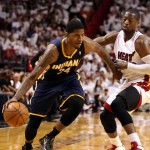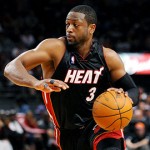 The dam seemed secure after Indiana’s pretty convincing Game 6 win over Miami. Then in the first half of Game 7, the dam broke, the floodgates came rushing open, and Indiana’s worst nightmare was realized.
The dam seemed secure after Indiana’s pretty convincing Game 6 win over Miami. Then in the first half of Game 7, the dam broke, the floodgates came rushing open, and Indiana’s worst nightmare was realized.
The Pacers committed 14 first half turnovers and were never really in the game, falling quietly to the Heat 99-76 in the finale of a fantastic Eastern Conference Finals series.
“We just focused on every possession, trying to get stops, play Miami Heat defense, create havoc,” LeBron James said after his 32-point effort in Game 7. “I thought we did that tonight.”
Consider what changed from Game 6 to Game 7 and tell me this wasn’t the worst-case scenario for Indiana.
- Indiana couldn’t shoot: The Game 7 loss must really sting, because Indiana’s field goal defense was really, really good over the last two games. Miami shot 36.1 percent in Game 6 and 39.5 percent in Game 7, but the Pacers went from 50 percent shooting in Game 6, to 40.6 percent on Monday. A huge reason for Indiana’s decline is not only Miami’s impressive defensive intensity, which should obviously be lauded, but Indiana’s drop-off from three. The Pacers were 10-for-18 from three in Game 6, and an abysmal 6-for-20 in Game 7.
- Miami had the urgency: Miami started being super aggressive, driving the ball into the lane and playing with the urgency that a Game 7 warranted. The Heat literally doubled its free throw attempts, improving from 19 in Game 6 to 38 on Monday night. The Las Vegas over/under on James free throws was 6 1/2, which he bested in the first half. The Heat only committed six fewer fouls than the Pacers did, but Miami made sure that the team was going strong to the hoop and getting to the foul line.”By any means necessary … we took care of business,” James said. Even Ray Allen got into the act, knocking down three huge treys in the first half to create separation in the second quarter.
 Wade finally showed up: Various members of the media suggested that Heat Coach Erik Spoelstra actually bench Dwyane Wade for Game 7 after a pretty dismal few games leading up to the elimination match. Looking at Wade’s stats, a case could have been easily made for that:
Wade finally showed up: Various members of the media suggested that Heat Coach Erik Spoelstra actually bench Dwyane Wade for Game 7 after a pretty dismal few games leading up to the elimination match. Looking at Wade’s stats, a case could have been easily made for that:
Wade FG % Points Rebs FTA Games 4-6 32.4 12 3.67 5.67 Game 7 43.8 21 9 9 “Everything that happened in the first six games didn’t mean anything to us,” Wade said. “It was about tonight. It was about Game 7. It was about finding a way to win here at home.”
Wade took it upon himself to make an impact in Game 7, and flourished by getting to the rim and the free throw line and grabbing rebounds over smaller Pacers. Wade had nine rebounds, more than anyone on the Pacers. Which leads us to the next reason why Game 7 was the worst-case scenario for Indiana.- The Pacers were outmuscled: Indiana, the best rebounding team in the NBA, lost the battle of the boards by seven, 43-36. After doubling up Miami in points in the paint in Game 6, 44-22, both teams scored 30 in the interior on Monday. That’s an enormous shift and a credit to Miami for adjusting and beating the Pacers at their own game. Chris Bosh finally woke up for Miami, getting all eight of his rebounds in the fateful first half. Paul George was basically neutralized completely in Game 7, and David West and Roy Hibbert couldn’t make the impact necessary to offset George’s off night.
- The backcourt failed: It was really simple. Indiana won in this series when the starting backcourt of George Hill and Lance Stephenson combined to shoot over 40 percent, and lost when they failed to do so. They were a combined 8-for-22 shooting in Game 7 (36 percent) and lost. Clearly this was not the only determining factor in the game, but those 14 shots the duo missed could have been taken by other high percentage shooters. And those potential makes would have taken away rebounds and potential offensive opportunities for Miami. So it does add up.
There is no doubt that the Pacers had a tremendous season, coming within one game (really, one James overtime layup in Game 1) of reaching the NBA Finals without Danny Granger. If they can bring back David West and incorporate Granger into the fold, Indiana’s depth issue will be alleviated and the team will be even better defensively going into next season. That’s a scary thought for every other team in the Eastern Conference.
It was just not Indiana’s night on Monday. Miami raised its intensity level, won the battle inside, got to the line, took George out of the game, got a vintage effort from Wade and turned Indiana’s biggest game in several years into an unmitigated nightmare.
(RELATED: Hubbard: To Keep Building his Own Dynasty, LeBron Must Defeat Another)
(RELATED: Sheridan Picks Spurs to Win in 7)
Shlomo Sprung loves advanced statistics and the way they explain what happens on the court. He is also the web editor of the Brooklyn Daily Eagle. A 2011 graduate of Columbia University’s Journalism School, he has previously worked for the New York Knicks, The Sporting News, Business Insider and other publications. His website is SprungOnSports.com. You can follow him on Twitter.
Not sure that 6/20 3-point shooting can be called abysmal for the Pacers. They’re not a good 3-point shooting team and if they had just one more make they’d be at 35% which is fine. They were slightly below average. The 10/18 was astonishingly hot and unsustainable: one reason why assuming that game 6 would carry over to game 7 was silly.
Also, can we not do the mythmaking that if not for the overtime layup by LeBron Indiana would have won the series? The whole thing would have played out differently if Indiana won game 1.